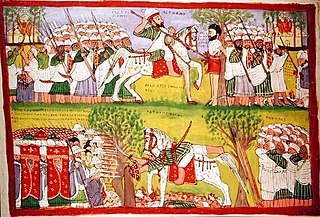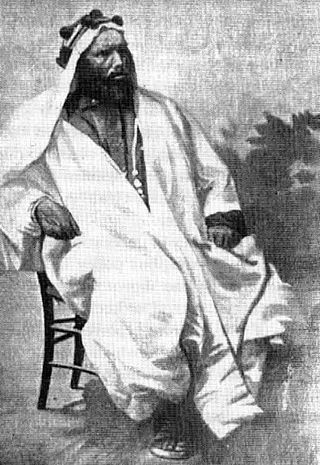Abyssinia is a historical name for the Ethiopian Empire.
Contents
Abyssinia may also refer to:
Abyssinia is a historical name for the Ethiopian Empire.
Abyssinia may also refer to:
Abyssinian may refer to:
Afar may refer to:
Italo-Ethiopian War, Italo-Abyssinian War or Italian invasion of Ethiopia / Abyssinia may refer to:
Abyssinian campaign can mean:

Tabot is a replica of the Ark of the Covenant, and represents the presence of God, in Ethiopian Orthodox and Eritrean Orthodox Churches. Tabot may variously refer to an inscribed altar tablet, the chest in which this tablet is stored, or to the tablet and chest together.
Habesha peoples is an ethnic or pan-ethnic identifier that has been historically employed to refer to Semitic language-speaking and predominantly Oriental Orthodox Christian peoples found in the highlands of Ethiopia and Eritrea between Asmara and Addis Ababa and this usage remains common today. The term is also used in varying degrees of inclusion and exclusion of other groups.

The Afar, also known as the Danakil, Adali and Odali, are a Cushitic ethnic group inhabiting the Horn of Africa. They primarily live in the Afar Region of Ethiopia and in northern Djibouti, as well as the entire southern coast of Eritrea. The Afar speak the Afar language, which is part of the Cushitic branch of the Afroasiatic family. Afars are the only inhabitants of the Horn of Africa whose traditional territories border both the Red Sea and the Gulf of Aden.

The Kunama are an ethnic group native to Eritrea. They are one of the smallest ethnic communities in Eritrea, constituting only 4% of the population. Most of the estimated 260,000 Kunama live in the remote and isolated area between the Gash and Setit rivers near the border with Ethiopia. The Kunama people have ancient ancestry in the land of Eritrea. In the 2007 Ethiopian census, however, the number of Kunama in Tigray has dropped to 2,976 as the remaining 2,000 or so members of this ethnic group have migrated into the other regions of Ethiopia.
Tigray may refer to:

Harsiotef was a Kushite King of Meroe.
Magdala was an ancient city on the shore of the Sea of Galilee believed to be the birthplace of Mary Magdalene.
Invasion of Ethiopia and Conquest of Ethiopia may refer to:

The military history of Ethiopia dates back to the foundation of early Ethiopian Kingdoms in 980 BC. Ethiopia has been involved in many of the major conflicts in the horn of Africa, and was one of the few native African nations which remained independent during the Scramble for Africa, managing to create a modern army. 19th and 20th century Ethiopian Military history is characterized by conflicts with the Dervish State, Mahdist Sudan, Egypt, and Italy, and later by a civil war.
"Nobody" is a popular song with music by Bert Williams and lyrics by Alex Rogers, published in 1905. The song was first publicly performed in February 1906, in the Broadway production Abyssinia. The show, which included live camels, premièred at the Majestic Theater and continued the string of hits for the vaudeville team of Williams and Walker.

The Ethiopian–Adal War or Abyssinian–Adal War, also known in Arabic as the "Futuḥ al-Ḥabash", was a military conflict between the Christian Ethiopian Empire and the Muslim Adal Sultanate from 1529 to 1543. The Christian Ethiopian troops consisted of the Amhara, Tigrayans, Tigrinya and Agaw people, and at the closing of the war, supported by a few hundred Portuguese musketmen. Whereas Adal forces were mainly comprised of Harla, Somali, Afar, as well as Arab and Turkish gunmen. Both sides at times would see the Maya mercenaries join their ranks.
Habash may refer to:
Ethiopian Greeks, or Greeks in Ethiopia, are ethnic Greeks from Ethiopia. Today they number about 500 persons and can be traced back to ancient times. They are mainly located in the capital, Addis Ababa, and the city of Dire Dawa.

Ras Alula Engida was an Ethiopian general and politician who successfully led battles against Ottoman Egypt, the Mahdists and Italy. He was one of the most important leaders of the Abyssinian forces during the 19th century. Described by Haggai Erlich as the "greatest leader whom Ethiopia produced since the death of Emperor Tewodros II in 1868." Ras Alula was referred to by Europeans as "the Garibaldi of Ethiopia".
Kidane, is a word in various Ethiopian Semitic languages that translates to covenant or vow. It is also a common male name in Ethiopia and Eritrea
Abyssinia is a musical in one act with music by Will Marion Cook and Bert Williams, and both book and lyrics by Jesse A. Shipp and Alex Rogers. Created by African-Americans and featuring African-American entertainers, the work is set in Abyssinia and was inspired by the events of the First Italo-Ethiopian War in 1896-1897 and the sustained sovereignty Ethiopia maintained through the leadership of Menelik II at that point in history. The plot of the musical follows two African-American from Kansas who win the lottery and then use their winnings to travel to Europe and Abyssinia. Misadventures ensue when one of them falsely accused of being a thief, and they are brought before King Menelik.